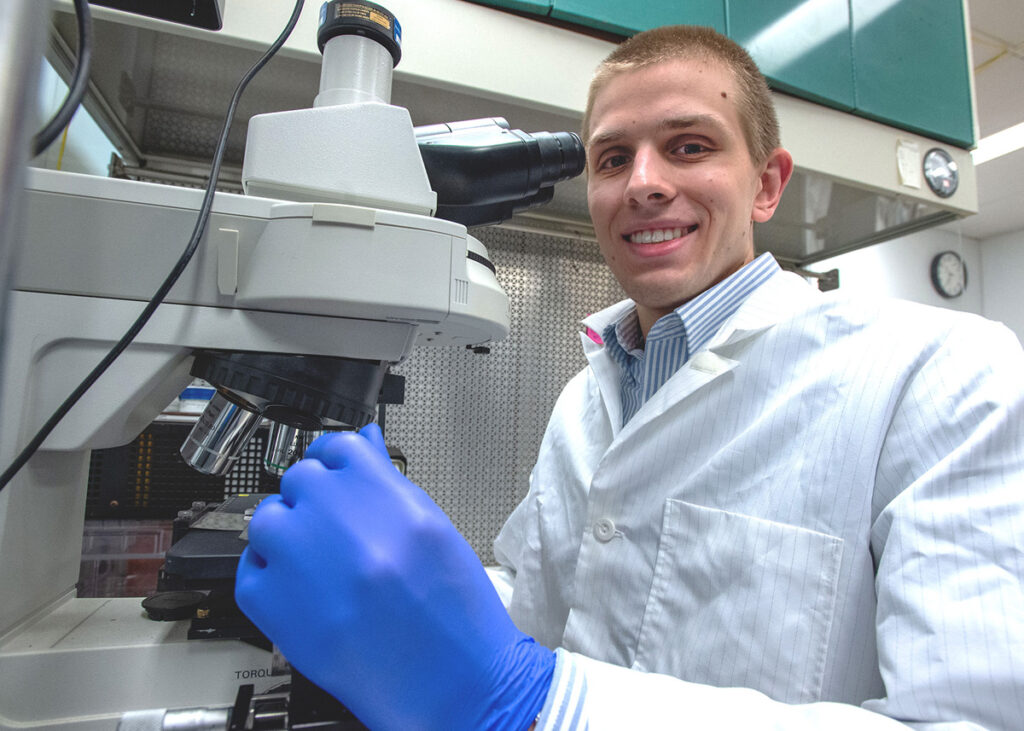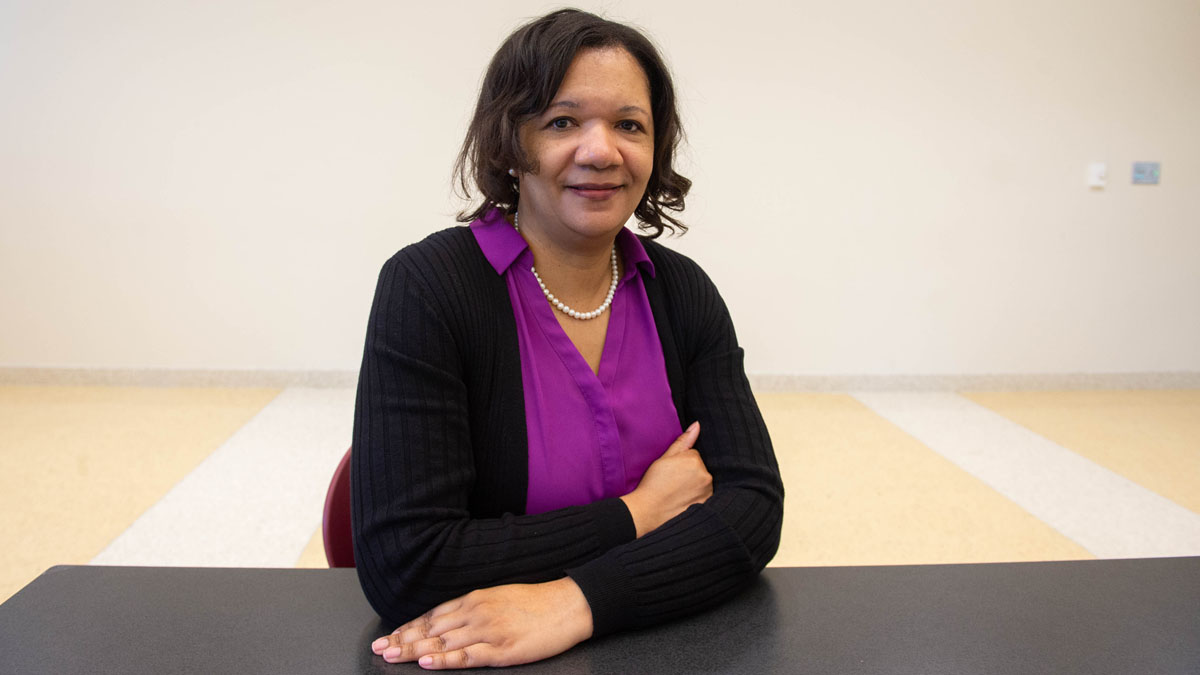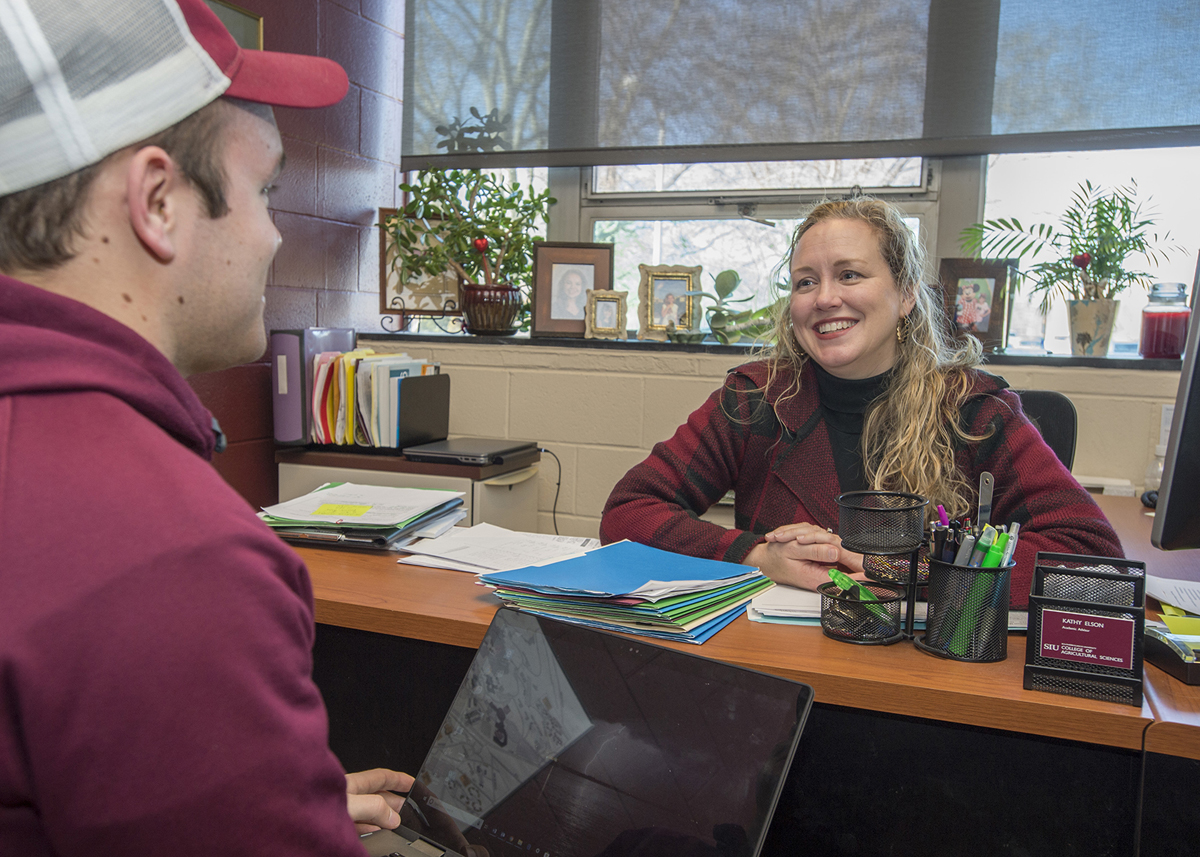Southern Illinois University Carbondale’s Lincoln Weber has earned a Barry M. Goldwater Scholarship and Excellence in Education Award, which is among the pinnacle of honors for undergraduate research students.
Weber, a senior physics major with a concentration in materials and nanophysics from West Lafayette, Indiana, learned that he is one of only 410 college students in the nation who will receive the award for the 2021-2022 academic year. He is the sixth SIU student to earn the award.
“SIU’s physics program has done a great job of preparing me for the future,” he said. “I’ve learned so much about physics during my time here, but my program has also helped me learn to solve problems, conduct laboratory experiments and generally be a good researcher. SIU has a physics degree program that can compete with any in the country.”
Weber has worked primarily on experimental physics projects. A 2017 Chancellor’s Scholarship recipient and member of the University Honors Program, Weber started his research trail in August 2017, his freshman year, after talking with his current research mentor, Professor Saikat Talapatra, for a class assignment. Talapatra invited Weber to his group meetings and that sparked Weber’s interest to start working in Talapatra’s lab, which led to further opportunities both in the group and elsewhere.
Perseverance rewarded
Weber said he views the award part of a “natural progression,” since he has experienced success in various research laboratories the last few years. He applied for the scholarship two years ago and wasn’t selected. While disappointed, Weber remained undeterred.
“I understood that I probably had less experience than most of the applicants, so my chances wouldn’t be that good,” he said. “My impression is that the review committee wants applicants to prove that they will be successful researchers with experience and motivation.”
The intervening time gave Weber added research experience and “perspective about how research is supposed to work.” He scrapped his previous application and took a fresh approach.
“I’m happy that I’ve finally done enough to show that I’ll be a good researcher in the future,” said Weber, who will graduate in May 2022.
Weber is one of 13 students from schools in Illinois to receive the award this year. There were nominations of more than 5,000 college sophomores and juniors.
Will provide an ‘ideal platform’
Talapatra said the award provides “the right opportunity and the ideal platform for Lincoln to become a future global leader not only in his chosen field of research but also a leader who can contribute to the advancement of research and education in science and technology in general.”
He recalls being impressed by Weber’s curiosity, initiative, sense of sincerity, keen interest and desire to challenge himself by becoming involved with cutting-edge research, even as a freshman.
“I can tell, without any shred of doubt that Lincoln’s academic acumen, his professional maturity, his discipline, work ethic, dedication to his work and his outstanding personality is perhaps at par with past Goldwater Scholars from SIU whom I have interacted with,” Talapatra said. “He is a true leader, with a sharp mind, outstanding management skills and a capacity to work hard. Lincoln, in my opinion, seems to enjoy the idea of being in a new place, learning new things and exploring other cultures quite a bit.”

Research opportunities opened
Weber’s research work allowed him to participate in several external research projects, including two summers (2018 and 2019) in Japan and last summer at Ohio State University. He plans to work with researchers at Penn State University this summer.
“All of these experiences have significantly shaped my career path,” he said. “I’ve been able to explore different fields of research, find out what I wanted to study in graduate school and learn a lot more about physics.”
Busy with research
Weber explained in general that his research falls along the lines of optical measurements, using lasers “to find out about the new and exciting properties of various types of materials” that can be applied in different areas. While he has worked primarily on fundamental physics, Weber explained it could “also lead to developments in, for example, ultrathin sensors or emitters, devices for computer components or solar cells.”
“By learning more about the materials used for these, we can improve them or even replace them with a more sophisticated, better design sometime in the future,” he said.
Weber has worked on a few different projects while at SIU, including one involving two-dimensional materials – crystals that are just nanometers thick.
“By measuring how they react to light, we can learn about their properties and how they could be applied,” Weber said. “I also created a transfer method that our group uses to move these microscopic crystals from one substrate to another.”
Outside of SIU, Weber worked on a couple projects “involving the ultrafast dynamics of materials – that is, how the electrons inside materials react to light over the time scale of a few quadrillionths of a second. I used a special laser that can shoot extremely short pulses of light, and I measured how those pulses are reflected off the sample.”
He also recently completed a theoretical project with researchers at Ohio State University, making a “computer simulation of the interaction between light and certain magnetic materials.”
University Honors Program is “really special”
In addition to the integral role faculty played, Weber also credits the University Honors Program, which he has been a part of since his first semester of college. The program provides a “great source of mentoring” and was also instrumental in Weber’s scholarship application
“It’s a really special program – there are no hoops to jump through. They mostly just make it easier for students to take classes that can be more engaging and interesting,” Weber said.
Jyotsna Kapur, Honors Program director, said Weber’s work is emblematic of what students involved with the program can achieve.
“We pride ourselves on working with students like Lincoln, to broaden their intellectual horizons and deepen their intellectual passions through individualized mentoring and opportunities for curricular, co-curricular and civic engagement,” she said.
Kapur thanked Elizabeth Donoghue, Honors Program assistant director and the program’s major scholarships coordinator, for working closely with Weber through the application process. She also credits the internal faculty panel who reviewed Weber’s application – Ken Anderson (Geology), Jayasekera Thushari (Physics), Boyd Goodson (Chemistry) and Bhaskar Bhattacharya (Mathematics).
The future
Weber said he enjoys living in Carbondale and working with the best research mentors and peers he’s met while taking classes with top-notch professors. He also enjoys Saluki home football and basketball games.
He will be applying to Ph.D. programs this fall and making a decision next spring. He plans to complete a five-year program in materials physics, continue his research and publish his work. He would like to work at one of the Department of Energy’s national laboratories, such as the Argonne National Laboratory or Fermilab, both near Chicago.







